Nostalgia
We're keeping a blog of our work plus bits and pieces as they develop.
Labels: beauty, composition, dance, elizebeth randall, travel
Labels: beauty, composition, dance, elizebeth randall, travel
 Notes for a variation on Torna a Surriento:
Notes for a variation on Torna a Surriento:Labels: beauty, composition, music, sfcco
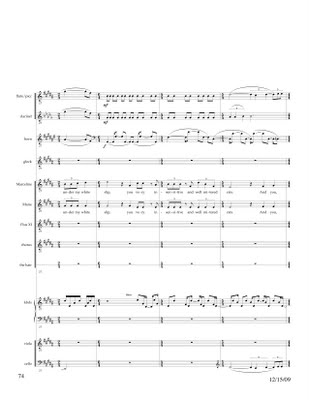 Clark Suprynowicz and I were talking opera libretti recently at a fundraiser for the John Duykers and Miguel Frasconi work-in-progress, Hand to Mouth: The Journey of the Seed from Soil to Plate, a opera-ette which draws on John's other career as organic farmer and nearly-organic beekeeper, and the fact of our divergent approaches made got me to thinking. I'm a prose man, and believe in the sanctity of the language, which is typically my entrée into a text-based piece. To reiterate, language is the key to an opera composition, the way in, containing something that strikes me as being musical, in whatever sense one takes that. I've been considering Queer again lately, as we are planning to remount that in the Spring of 2011 as the 10th anniversary of the premiere and the 25th anniversary of the book's publication. Burroughs's writing is very musical, its flow and lilt and repetitions and its connection straight to the gut, not poetic in the old-fashioned sense of meter and foot, but its music inspired my own. In comparison, Clark's cavalier attitude to what his librettists have written down, and the fact that he bends their words to fit his tunes, seem quite sinful. For me, tunes and music spring from the words, although I hope that the music isn't simply painting colors over the words and that the music that comes from this interaction can stand on its own. I remember being asked once by a singer during the development of an early piece which sections were recit and aria and I realized it hadn't even crossed my mind. I was presenting the text, and I suppose some sections fit one label or the other, that some were internal monologue, outside of the action, and some were more action oriented, but I didn't stop somewhere along the way to sing a song, a song with a melody upon which the words were hung.
Clark Suprynowicz and I were talking opera libretti recently at a fundraiser for the John Duykers and Miguel Frasconi work-in-progress, Hand to Mouth: The Journey of the Seed from Soil to Plate, a opera-ette which draws on John's other career as organic farmer and nearly-organic beekeeper, and the fact of our divergent approaches made got me to thinking. I'm a prose man, and believe in the sanctity of the language, which is typically my entrée into a text-based piece. To reiterate, language is the key to an opera composition, the way in, containing something that strikes me as being musical, in whatever sense one takes that. I've been considering Queer again lately, as we are planning to remount that in the Spring of 2011 as the 10th anniversary of the premiere and the 25th anniversary of the book's publication. Burroughs's writing is very musical, its flow and lilt and repetitions and its connection straight to the gut, not poetic in the old-fashioned sense of meter and foot, but its music inspired my own. In comparison, Clark's cavalier attitude to what his librettists have written down, and the fact that he bends their words to fit his tunes, seem quite sinful. For me, tunes and music spring from the words, although I hope that the music isn't simply painting colors over the words and that the music that comes from this interaction can stand on its own. I remember being asked once by a singer during the development of an early piece which sections were recit and aria and I realized it hadn't even crossed my mind. I was presenting the text, and I suppose some sections fit one label or the other, that some were internal monologue, outside of the action, and some were more action oriented, but I didn't stop somewhere along the way to sing a song, a song with a melody upon which the words were hung.Just for the record, I believe (and I *was* sitting there with him) that he 'walked out', ahem, during intermission, because his back was hurting him. If you want to, ahem, add a little footnote to your post, detailing the dry boring reality (in contrast to the dramatic characterization!) -- feel free :)
Labels: composition, music, opera
 I recently received a request for submissions for a contemporary music composition concert, which happens to be taking place in the city of Eagle Rock, California, where I once studied the craft. In it was this light bit of manifesto:
I recently received a request for submissions for a contemporary music composition concert, which happens to be taking place in the city of Eagle Rock, California, where I once studied the craft. In it was this light bit of manifesto:The theme of this concert is music, literature, and art that evoke in the listener some aspect of the human emotional experience (i.e., love/pain/sorrow/fear/madness/ laughter/faith/hope/etc.). The key is that this music needs to be emotionally expressive, relatable, and readily accessible to the average listener (this of course doesn’t mean that the music necessarily needs to be programmatic). Avant-garde, atonal, experimental music, or compositions that require higher education to comprehend it are simply not appropriate for the theme of this concert.I was incensed of course, on finding myself transported to a mirror world where not only left was right but up was down, where all that I knew and loved and up with which I grew was no longer true or meet or right or salutary and that my previous notion, that the music I had listened to from my childhood and thought relatable, expressive and more was actually not so. I trashed the email in a huff, but then, later, I untrashed it, and read and read and dissected it, dwelling on it, working myself into a fit. I googled the composers, the venue, every major noun in it, and brought forth the firehose of data from the net, fascinated.
Labels: competition, composition, music

A 23-year-old woman who said she was hearing voices stripped her three small children naked Wednesday and threw them off a San Francisco fishing pier into the bay, authorities said. - San Francisco Chronicle, October 20, 2005In fact, I remembered it very well, because Lynne and I happened across the makeshift memorial a few days after it occurred: flowers, stuffed animals, notes, photos, candles; all left in a vain attempt to palliate the horror of the crime. The story rolled around in my head for many days after that discussion, and I ended up buying a small notebook and some pens on a visit to Lynne's family
Labels: composition, dance, god's chosen, opera
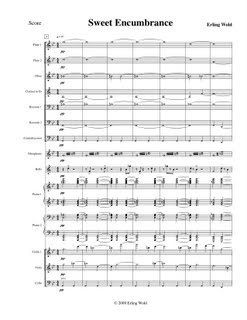 Continuing with the treacly investigation of romance and its elations, its euphoric pleasures, begun with Two Orchestral Waltzes for Lynne, the current work, Sweet Encumbrance, makes manifest, in sound, the joyous warmth, the sweet iron fetters and the small panics which flow from hogtying oneself together with one's chosen helpmeet and companion. In this piece, it is demonstrated in some detail how much one can gain in life simply by giving up one's philandering, and, while still given license to strut and flirt and still authorized to play the dandy, one must now, for the foreseeable future, festoon one's costume with the leash and collar and electronic ankle bracelet, sometimes visible but most often invisible, like the line that one might be enticed to cross save for the memories of the previous attempts' resultant truncheoning and electric shocks. But let us not dwell on such past pains, but please to look to that bright future world illumined by the brightest and whitest of most pure light where, joined in glory and set upon one's throne just to the right of the Empress, in a new Sagrada Familia, happily holding court, happily holding the hand of the one most beloved.
Continuing with the treacly investigation of romance and its elations, its euphoric pleasures, begun with Two Orchestral Waltzes for Lynne, the current work, Sweet Encumbrance, makes manifest, in sound, the joyous warmth, the sweet iron fetters and the small panics which flow from hogtying oneself together with one's chosen helpmeet and companion. In this piece, it is demonstrated in some detail how much one can gain in life simply by giving up one's philandering, and, while still given license to strut and flirt and still authorized to play the dandy, one must now, for the foreseeable future, festoon one's costume with the leash and collar and electronic ankle bracelet, sometimes visible but most often invisible, like the line that one might be enticed to cross save for the memories of the previous attempts' resultant truncheoning and electric shocks. But let us not dwell on such past pains, but please to look to that bright future world illumined by the brightest and whitest of most pure light where, joined in glory and set upon one's throne just to the right of the Empress, in a new Sagrada Familia, happily holding court, happily holding the hand of the one most beloved.Labels: beauty, composition, lynne rutter, music
And beneath upon the hem of it thou shalt make pomegranates of blue, and of purple, and of scarlet, round about the hem thereof; and bells of gold between them round about:
A golden bell and a pomegranate, a golden bell and a pomegranate, upon the hem of the robe round about.
And it shall be upon Aaron to minister: and his sound shall be heard when he goeth in unto the holy place before the LORD, and when he cometh out, that he die not.
Labels: beauty, composition, mass, music
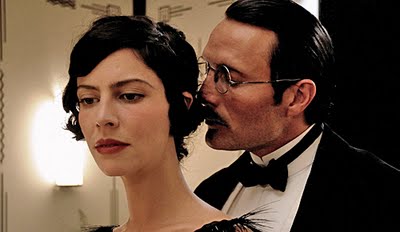
I have all around me the spectacle of composers who, after their generation has had its decade of influence and fashion, seal themselves off from further development and from the next generation. Of course, it requires greater effort to learn from one's juniors, and their manners are not invariably good. ... The very people who have done the breaking through are themselves often the first to try to put a scab on their achievement. What fear tells them to cry halt? What security do they seek, and how can it be secure if it is limited? How can they forget that they once fought against what they have become?I have to admit that it is v. difficult for me to learn from my juniors. My typical reaction to the artistic successes of freshly minted composers is envy and jealousy tempered only by rage, depression and frustration, and although, in my case, I really have very little that I am fighting for, except my own self-aggrandizement, as I am an eclectic and polyamorous lover of styles and ideas and threads of artistic development, it's hard for me to get past the pettiness that so pervades my soul. But in deference to the idol of my youth, I resolve to try.
Labels: composition, tips for better living
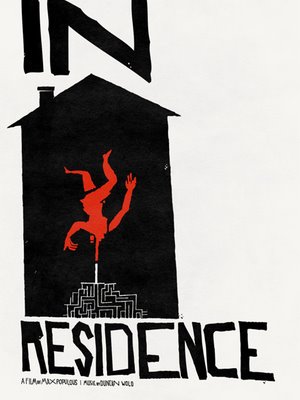 My son, showing that he is a child of the same Adam, has constructed a heavenly collection of musical fragments, a Soundscape for a Nonexistent Motion Picture, but which, by its synopsis, makes one strongly wish for its actual production:
My son, showing that he is a child of the same Adam, has constructed a heavenly collection of musical fragments, a Soundscape for a Nonexistent Motion Picture, but which, by its synopsis, makes one strongly wish for its actual production:This haunting film is not for the faint of heart — or the claustrophobic. We are presented with Jane, an artist who begins a residency at a strange home filled with junk. Her goal is to fashion the detritus into a piece of artwork speaking to the theme of recycling and ‘green’ building practices. But things get twisted when the junk compels her to construct an elaborate and, at times, beautiful trap for herself, which she slowly begins to realize is locking her in, pressing her downward into infinite, interlocking chambers. Even as she becomes more entangled in the web of the house, it begins to provide her with sustenance necessary to continue her work.
— Dina Bloomberg, Down the Rabbit Hole Zine
Labels: beauty, composition, duncan, film, music
Labels: composition, electronic music, music, teddy ruxpin
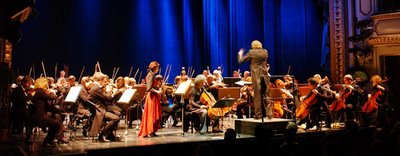 I met Elena and Alexei when they performed in the 2001 Austrian production of A Little Girl Dreams of Taking the Veil, Alexei on the podium and Elena covering the viola, my favorite bit of which is the brief and registrally displaced but oh so beautiful solo here:
I met Elena and Alexei when they performed in the 2001 Austrian production of A Little Girl Dreams of Taking the Veil, Alexei on the podium and Elena covering the viola, my favorite bit of which is the brief and registrally displaced but oh so beautiful solo here:
When I see a kid composing in units of measure, measure, measure, with a new impetus, new phrase, new harmony on every downbeat, I start in with my wheedling tone (every experienced composition student will recognize the sound): "How about a triple upbeat to start that melody off a little more gracefully?" "How about we vary the harmonic rhythm here?" "You think the audience can't hear where your bar-lines are if you don't accent every one?"
Labels: beauty, composition, electronic music, opera
 Bath-time this morning was facilitated by an iPhone 3G® in a Ziploc® bag - thanks to my friend Nicole for enlightening me of this wonderful invention - and a circuitous path through those intoxicating days early in the last century where Hilbert and Brouwer led the fight over the non-finitary law of the excluded middle (see photo) and other such issues.
Bath-time this morning was facilitated by an iPhone 3G® in a Ziploc® bag - thanks to my friend Nicole for enlightening me of this wonderful invention - and a circuitous path through those intoxicating days early in the last century where Hilbert and Brouwer led the fight over the non-finitary law of the excluded middle (see photo) and other such issues. Labels: beauty, composition, music
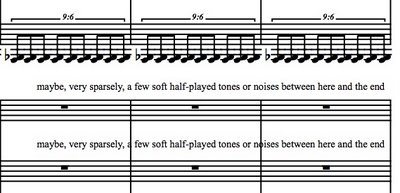 The score is done, the parts have been shipped away once again, and, while usually one for absolute control - a chimera at best - I have abrogated my responsibility as a Komponist to allow the so-called performers a bit of leeway, one arm unbound from the straightjacket, a rest from the hamster wheel, the industrialist lightening for the moment the blows on the backs of the restive workers, but this philosophical change of heart, like most, has come from expediency rather than deep thought, as my compositional laziness seems to increase year upon year. I remember a day in the not so distant past where, to begin the simplest of tunes, I first had to build the instruments, sawing and sanding into the wee-est hours to the ire of my roommates, decide on a tuning, and, locked in my slattering studio, learn to play the aforementioned devices or at the least to coax a sound. But now my compositional life has settled into a pattern: (1) agree to a deadline (2) wait until the last possible moment (3) use every shortcut, trick, careless theft and accident to produce something as quick as possible. I had lunch with my friend and co-producer Paul Dresher the other day and had to hide my head in shame after listening to him describe the months of preparation on Shick Machine, building the instruments, learning to ... yes, you get the idea, everything I had been, and revealing to all the shadow I have become.
The score is done, the parts have been shipped away once again, and, while usually one for absolute control - a chimera at best - I have abrogated my responsibility as a Komponist to allow the so-called performers a bit of leeway, one arm unbound from the straightjacket, a rest from the hamster wheel, the industrialist lightening for the moment the blows on the backs of the restive workers, but this philosophical change of heart, like most, has come from expediency rather than deep thought, as my compositional laziness seems to increase year upon year. I remember a day in the not so distant past where, to begin the simplest of tunes, I first had to build the instruments, sawing and sanding into the wee-est hours to the ire of my roommates, decide on a tuning, and, locked in my slattering studio, learn to play the aforementioned devices or at the least to coax a sound. But now my compositional life has settled into a pattern: (1) agree to a deadline (2) wait until the last possible moment (3) use every shortcut, trick, careless theft and accident to produce something as quick as possible. I had lunch with my friend and co-producer Paul Dresher the other day and had to hide my head in shame after listening to him describe the months of preparation on Shick Machine, building the instruments, learning to ... yes, you get the idea, everything I had been, and revealing to all the shadow I have become.Labels: composition, music

Labels: beauty, composition, electronic music, music, sfcco
As per its full title, "Alamo! a scena for a cappella voice and Bible (King James version)," calling "Alamo!" an "opera" is an error in scale - kind of like calling a one-act play a full-length play, or, say, any orchestral piece in one movement a symphony.Labels: composition, music, opera
 A longstanding jest of mine was to answer, when asked about my career goals, that I wanted to be at least as famous as Irving Fine, he being (in my mind) a perfect example of a composer of some talent who is known by other composers but not well known among the general populace, unlike some of his fellows in the Boston Six, e.g. Lenny Bernstein and Aaron Copland and also due to the rhythmic-rhyming connection between our monikers. Unfortunately this particular goal will most likely not be achieved, but recently I found the late composer and I have some interests in common. From the bio by Phillip Ramey:
A longstanding jest of mine was to answer, when asked about my career goals, that I wanted to be at least as famous as Irving Fine, he being (in my mind) a perfect example of a composer of some talent who is known by other composers but not well known among the general populace, unlike some of his fellows in the Boston Six, e.g. Lenny Bernstein and Aaron Copland and also due to the rhythmic-rhyming connection between our monikers. Unfortunately this particular goal will most likely not be achieved, but recently I found the late composer and I have some interests in common. From the bio by Phillip Ramey:Although Irving's sisters frequently used the word "normal" to describe their brother, his first sexual experience was anything but that. He told Verna, who confided it to her daughters many years later, that at age six he had been molested by a twelve-year-old neighborhood girl who was acting as his babysitter. He was sexually active early on, and in his teens sometimes frequented whorehouses in Boston with a friend named Stanley. He also liked to write smutty limericks.Verna recalled that Irving appreciated women with large breasts, theorizing that this might be because his mother and sisters were thus endowed. One summer in the late 1940s, while sitting on the lawn with his wife and Aaron Copland, Irving gave a quiet wolf whistle as an extremely busty female in a revealing halter passed by. Verna, who had average-sized breasts and was used to his ways, said, "Oh, Irving, act your age." Copland, puzzled, asked: "Can you explain to us why you like those ghastly things?" Irving just smiled. All his life he was a bit of a flirt, charming both sexes, although Verna insisted that he had no homosexual inclinations, even in adolescence.
Labels: composition, fashion, sexuality

Lou Harrison's Music Primer was one of many very influential and important books in my musical development. At the time I read it, I was rediscovering a certain melodic simplicity in my own work. His ideas shaped some of mine, but I was especially taken with one particular passage, somewhat outside of the world of music composition per se, but dealing with that which is most important to a career in the arts, namely that a pure career in the arts is an essential impossibility:
If you really have to be a composer and are attractive and uninhibited, then try and get yourself “kept” – whether by woman or man. This might be easier than undertaking a whole second career in order to be able to afford composing, and you might get a little restorative affection as well.
Unfortunately, I was stupid enough, and probably too inhibited at the time - my late teens, not to follow his advice, to try to make a go of the 'second career' path, to give up sleep, and not to take the high road: to flatback and think of England, to become a good wife, flipping my hair and asking on my knees for a bit more pin money from my loving husband.
But later in life I did figure out that the judicious - or injudicious - placement of my unit in a number of compromising positions could in fact be helpful to the bit of musical career that I eked out on the side. In the late-mid 80s I started working with choreographer and dancer Miss W_ on an extended series of pieces. The first and maybe the best was Crash, an hallucination on the already hallucinatory J.G. Ballard novel. My pal Henry Kaiser had recently purchased a Synclavier and a few of the local classical avant types were thrusting their bowls in his face and asking for a bit of the corn gruel drippings off its gleaming steel and black plastic but I had a key, haha!, since Hank and I were working on Secrets and Mysteries (aka Secrets of the Unknown) with Edward Mulhare, using the early sampler to write as much music as quickly as possible. I stole into his beautiful little studio and worked all night every night coaxing as many floating microtonal lushnesses as I could for Crash and Hagalaz and the others. And why, may one inquire, would I work my little ears to the ossicles to find the perfect romantic musical moment, the perfect twist of pitch ratios adding a glint of a knife to a pretty harmony? Because I was in love. And, when Miss W_ came to hear it for the first time, sitting in the dark of the studio late at night, the fullness of my gift fell upon her, parting her lips, spreading her legs ever so slightly. Later, at a restaurant far away, she looked into my eyes and told me of her most favored venereal pleasure, something so near and dear to my heart that my pulse quickened at the thought, and I flipped through a number of scenarios and possibly near-term advantages and pleasures, but, like everyone else who desires and desires so strongly, I hadn't quite thought through the rest of the story: the pain, the recriminations, the crying and the destruction and the loss, but, before that all came to pass, we spent ourselves through a burst of creativity that produced some of my still favorite works, and some of my still favorite memories: risky sweaty writhings under soft sheets, towels put down to catch the blood; hot tubs overfilled of naked lissome dancers, their supple fingers probing under the foaming jets; furtive quasi-couplings in cars, backstage before a performance, in the corner of a darkened gay bar; sweet shared conspiracies.
And at one of our performances at the Lab in San Francisco was a young choreographer named Robert Wechsler, just beginning to develop a new language of sinuous dances based on groups, canons and symmetries, where the dancers moved quickly through each other in seemingly impossible ways, who took a liking to me (and I'm sure Miss W_), and he kept in touch, asking me from time to time to contribute short soundtracks to dances, e.g. Modules and Loops. Not long after, Robert developed some financial complexities in the US, and moved to Nürnberg to allow things to cool. By the mid 90s I had forgotten all the lessons learned with Miss W_ and was embarking on another long walk off a short pier with Ms. A_. Once again, I enjoyed a burst of creativity, my pen pouring out one inspired score after another, intending to woo and succeeding again beyond my expectations and beyond my ability to deal with it. Once again, I found myself pressed against a lithe body, this time straddling me, allowing my hands to wander over her prepubescently boyish frame, a suggestion of immodest nature whispered to me, hot breath on my ear, kisses on my face. Once again, I was caught up in clandestine plans, this time of a global nature, a vast intrigue tapping into a worldwide network of co-conspirators. I accepted an offer from Robert to come to Europe to work with his company, Palindrome, on an evening of dance and music using a set of interactive technologies: a MIDI controlled pipe organ, dancer-tracking software, heartbeat monitors, the very new and pre-browser Internet. And surprise, it so happened that Ms. A_ was working on a project in Prague, a short train ride away, and so came to visit, pleasantly insinuating herself in the company and, after I left, performing on tour with them through Austria.
While performing with Palindrome in Klagenfurt in the south of the Austrian republic, Ms. A_ left a tape with the theater of my first chamber opera, A Little Girl Dreams of Taking the Veil. Although they didn't care much for the production, a reflection I believe on the cultural divide between the Old and New World, they found themselves drawn back to the music a number of years later and asked me if would be willing to have them perform it and, if possible, to develop a version in German. Although, by the time this came about, my life had plummeted into chaos and into an even more complex sexual by-now-quadrangle including another Ms. A_, a young woman of great vigor and blondness who evinced in me a before unknown tendency for obsessive stalking behavior, one of the high points of my life came while descending into the Klagenfurt airport, a Tyrolean Air flight attendant in an absurdly sexy dirndl leaning over me, noticing a photograph of a woman's mouth covered in blood in the newspaper of the passenger in front of me, seeing my name in the caption of that gory image, landing a few moments later and being greeted as Maestro by the theater director, sweeping me into the dress rehearsal and a magical otherworld, jetlagged and fagged and fashed. The first Ms. A_, who was again performing in the Easter bloc, once again came to meet me, but this scene quickly descended into the by now familiar recrimination, tears, anger, drama and worse and worse. As Ali Tabatabai once told me, we theater folk know not where the stage ends. But, just possibly, do the means justify the terrible endings?
And this now reminds me: a dream-like trip to Amsterdam with a friend to live out one of her fantasies: that of having two young Dutch boys simultaneously. We tripped and traipsed and shagged our way through the red-light district looking for connections to these ultimate striplings, the perfect combination of enthusiasm and ability and fresh-faced boyishness. In one of these fact-finding encounters of flat-backing fieldwork, the two of us were huffing and puffing and panting over a quite amazingly beautiful and busty Dutch fille de joie who, hearing of our desires, gave us her mobile number and invited her to her wedding in Rotterdam the next week, assuring us that her soon-to-be husband and one of his friends would without doubt fill the bill and that having some other artistic & libertine types there would surely be of benefit to all.
And so, after Klagenfurt and the collapse of the entire quadrangle in flaming death, and as a period of even more intense sluttiness and my relationship with Lynne "die Zweite" began, the Max Ernst museum in Brühl and I planned to have the Little Girl opera performed as part of the dedication of an Ernst sculpture, newly installed. I showed up in town with my freshly blue hair, gathering some curious stares from the locals, overseeing the installation of an outdoor stage for the production, the arrival of the ensemble and all the rest. Also, at this time, Sub Pontio Pilato, also recently translated into German, was heading for its quirky premiere in Austria where a certain Miss B_ was starring, who wanted to come up to Brühl to meet me and see something of what I do. I was feeling my oats, as virility comes with success, and something happened which my gentlemanly upbringing does not allow me to divulge. Even though, with some familiarity, this led to some drama back home with the Empress, Miss B_ and I cemented a personal and artistic connection so that, after the Pilate premiere, she went back to St. Gallen and played the Credo from the opera for the musical director at the Abbey. After an Austrian review of Pilate claimed that the Credo must have come from a pre-existing Mass, I wanted to create such a thing: a crucifix of pieces overlaid, a pre-existing piece from an alternate youth, a time of innocence and faith, before the devil grabbed hold of my soul and I made that Faustian bargain, taking the path of sin, the path of success.
Labels: beauty, composition, music, sexuality
 Stravinsky and Dylan Thomas were to write an opera together but Thomas drank himself to death before they could begin. Stravinsky wrote that this was "a terrible blow to me as well as to all those who knew Dylan Thomas's genius." Stories of creations unmade, like this one, always seem so insufferably sad to me. Even though we did receive In Memoriam Dylan Thomas out of the tragedy, what might have come?
Stravinsky and Dylan Thomas were to write an opera together but Thomas drank himself to death before they could begin. Stravinsky wrote that this was "a terrible blow to me as well as to all those who knew Dylan Thomas's genius." Stories of creations unmade, like this one, always seem so insufferably sad to me. Even though we did receive In Memoriam Dylan Thomas out of the tragedy, what might have come? Labels: beauty, composition, music, opera

Labels: beauty, composition, music, opera
Labels: beauty, composition, fognozzle, music, sfcco
 The book-larnin' study of Composition and its even poorer cousins of Species Counterpoint and ostensible Harmony didn't teach me much of what I needed to know to actually succeed as a soi-disant composer. Here is an almost surely abridged list of what skills were needed just for Mordake. I publish this only in the interest of scaring off some young bucks and does and reducing the competition for various grants and whatnot.
The book-larnin' study of Composition and its even poorer cousins of Species Counterpoint and ostensible Harmony didn't teach me much of what I needed to know to actually succeed as a soi-disant composer. Here is an almost surely abridged list of what skills were needed just for Mordake. I publish this only in the interest of scaring off some young bucks and does and reducing the competition for various grants and whatnot.Labels: composition, mordake, music, opera
Labels: beauty, composition, mass, music
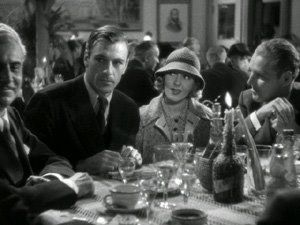 Since other composers and artists are often curious about the finances of my operas, let's please have a moment of silence here for all the dollars burned to a cinder in my many vanity productions.
Since other composers and artists are often curious about the finances of my operas, let's please have a moment of silence here for all the dollars burned to a cinder in my many vanity productions. Labels: composition, money, opera

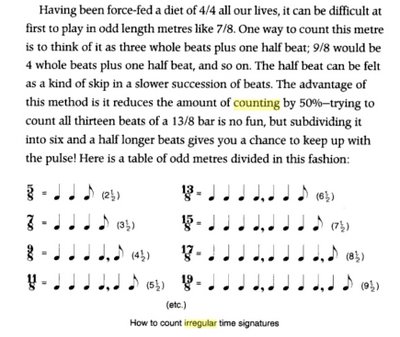
Labels: composition, music, rhythm
Labels: art, beauty, composition, depression, mordake, opera

Labels: composition, lou harrison, money, music
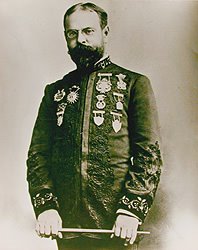 The SFCCO commissioned a number of us to write a set of variations on Stars and Stripes Forever, the one that goes as follows (yes, I get them all confused, the tapestry of Sousa marches, each cut from the same cloth, but what a fine cloth it is, akin to the cloth of the Strauss waltzes, so please sing along): be kind to your web footed friends etc. It was due last week but I am late, very very late, but I do have the program notes done, which I suppose is something, so here they are:
The SFCCO commissioned a number of us to write a set of variations on Stars and Stripes Forever, the one that goes as follows (yes, I get them all confused, the tapestry of Sousa marches, each cut from the same cloth, but what a fine cloth it is, akin to the cloth of the Strauss waltzes, so please sing along): be kind to your web footed friends etc. It was due last week but I am late, very very late, but I do have the program notes done, which I suppose is something, so here they are:Labels: composition, music, sfcco
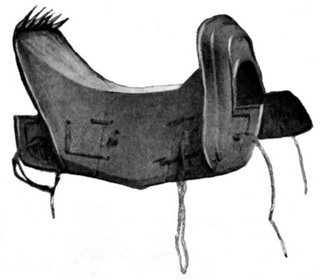 from the wikipedia article on Louis Vierne:
from the wikipedia article on Louis Vierne:Labels: composition, depression, sexuality
 I was informed by electronic post late last night that Lynne has been blogging her work for Mordake. As of yesterday morning I finally finished setting the last of Douglas's text, almost just barely too late as we really are in the middle of rehearsals, and Herr Weiß is here only for another week or so, and M. Duykers is back in Florida performing final excruciations on his students. Several would-be assistants had other projects interfere with their participation, but luckily our friend Diana showed up direct from Amersfoort NL, firmly gripped the handle of our construction problems, caused the Jack in the Box to pop out, and has left us all deeply satisfied with her work.
I was informed by electronic post late last night that Lynne has been blogging her work for Mordake. As of yesterday morning I finally finished setting the last of Douglas's text, almost just barely too late as we really are in the middle of rehearsals, and Herr Weiß is here only for another week or so, and M. Duykers is back in Florida performing final excruciations on his students. Several would-be assistants had other projects interfere with their participation, but luckily our friend Diana showed up direct from Amersfoort NL, firmly gripped the handle of our construction problems, caused the Jack in the Box to pop out, and has left us all deeply satisfied with her work. Labels: composition, douglas kearney, frieder weiss, john duykers, lynne rutter, mordake, music, opera